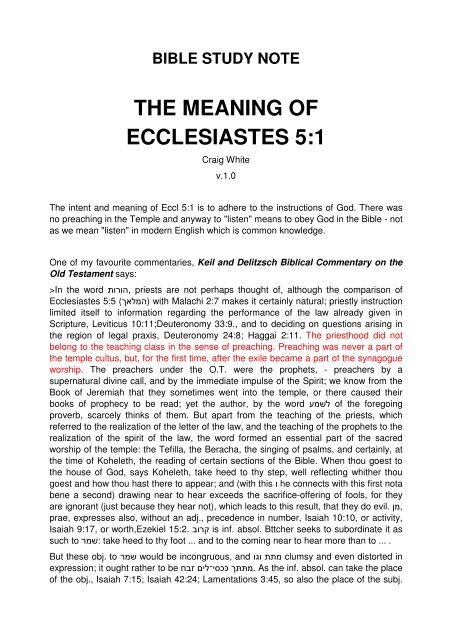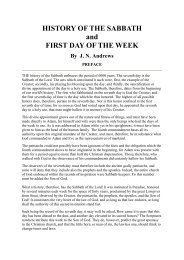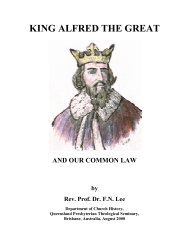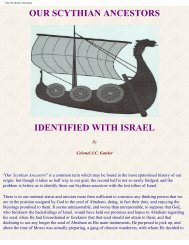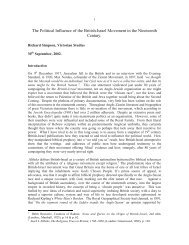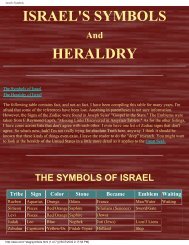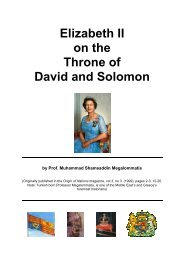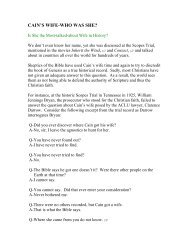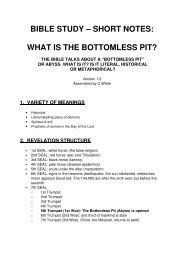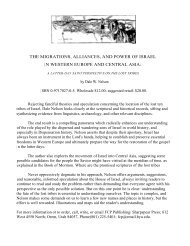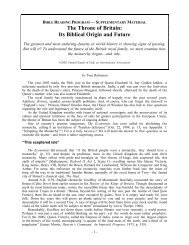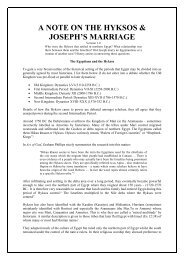bible study note the meaning of ecclesiastes 5:1 - Origin of Nations
bible study note the meaning of ecclesiastes 5:1 - Origin of Nations
bible study note the meaning of ecclesiastes 5:1 - Origin of Nations
Create successful ePaper yourself
Turn your PDF publications into a flip-book with our unique Google optimized e-Paper software.
BIBLE STUDY NOTE<br />
THE MEANING OF<br />
ECCLESIASTES 5:1<br />
Craig White<br />
v.1.0<br />
The intent and <strong>meaning</strong> <strong>of</strong> Eccl 5:1 is to adhere to <strong>the</strong> instructions <strong>of</strong> God. There was<br />
no preaching in <strong>the</strong> Temple and anyway to "listen" means to obey God in <strong>the</strong> Bible - not<br />
as we mean "listen" in modern English which is common knowledge.<br />
One <strong>of</strong> my favourite commentaries, Keil and Delitzsch Biblical Commentary on <strong>the</strong><br />
Old Testament says:<br />
>In <strong>the</strong> word ,הורות priests are not perhaps thought <strong>of</strong>, although <strong>the</strong> comparison <strong>of</strong><br />
Ecclesiastes 5:5 (המלאך) with Malachi 2:7 makes it certainly natural; priestly instruction<br />
limited itself to information regarding <strong>the</strong> performance <strong>of</strong> <strong>the</strong> law already given in<br />
Scripture, Leviticus 10:11;Deuteronomy 33:9., and to deciding on questions arising in<br />
<strong>the</strong> region <strong>of</strong> legal praxis, Deuteronomy 24:8; Haggai 2:11. The priesthood did not<br />
belong to <strong>the</strong> teaching class in <strong>the</strong> sense <strong>of</strong> preaching. Preaching was never a part <strong>of</strong><br />
<strong>the</strong> temple cultus, but, for <strong>the</strong> first time, after <strong>the</strong> exile became a part <strong>of</strong> <strong>the</strong> synagogue<br />
worship. The preachers under <strong>the</strong> O.T. were <strong>the</strong> prophets, - preachers by a<br />
supernatural divine call, and by <strong>the</strong> immediate impulse <strong>of</strong> <strong>the</strong> Spirit; we know from <strong>the</strong><br />
Book <strong>of</strong> Jeremiah that <strong>the</strong>y sometimes went into <strong>the</strong> temple, or <strong>the</strong>re caused <strong>the</strong>ir<br />
books <strong>of</strong> prophecy to be read; yet <strong>the</strong> author, by <strong>the</strong> word לׁשמע <strong>of</strong> <strong>the</strong> foregoing<br />
proverb, scarcely thinks <strong>of</strong> <strong>the</strong>m. But apart from <strong>the</strong> teaching <strong>of</strong> <strong>the</strong> priests, which<br />
referred to <strong>the</strong> realization <strong>of</strong> <strong>the</strong> letter <strong>of</strong> <strong>the</strong> law, and <strong>the</strong> teaching <strong>of</strong> <strong>the</strong> prophets to <strong>the</strong><br />
realization <strong>of</strong> <strong>the</strong> spirit <strong>of</strong> <strong>the</strong> law, <strong>the</strong> word formed an essential part <strong>of</strong> <strong>the</strong> sacred<br />
worship <strong>of</strong> <strong>the</strong> temple: <strong>the</strong> Tefilla, <strong>the</strong> Beracha, <strong>the</strong> singing <strong>of</strong> psalms, and certainly, at<br />
<strong>the</strong> time <strong>of</strong> Koheleth, <strong>the</strong> reading <strong>of</strong> certain sections <strong>of</strong> <strong>the</strong> Bible. When thou goest to<br />
<strong>the</strong> house <strong>of</strong> God, says Koheleth, take heed to thy step, well reflecting whi<strong>the</strong>r thou<br />
goest and how thou hast <strong>the</strong>re to appear; and (with this ו he connects with this first nota<br />
bene a second) drawing near to hear exceeds <strong>the</strong> sacrifice-<strong>of</strong>fering <strong>of</strong> fools, for <strong>the</strong>y<br />
,מן evil. are ignorant (just because <strong>the</strong>y hear not), which leads to this result, that <strong>the</strong>y do<br />
prae, expresses also, without an adj., precedence in number, Isaiah 10:10, or activity,<br />
Isaiah 9:17, or worth,Ezekiel 15:2. קרוב is inf. absol. Bttcher seeks to subordinate it as<br />
such to :ׁשמר take heed to thy foot ... and to <strong>the</strong> coming near to hear more than to ... .<br />
But <strong>the</strong>se obj. to שמר would be incongruous, and מתת וגו clumsy and even distorted in<br />
expression; it ought ra<strong>the</strong>r to be ּככסי־לים זבח .מּתּתך As <strong>the</strong> inf. absol. can take <strong>the</strong> place<br />
<strong>of</strong> <strong>the</strong> obj., Isaiah 7:15; Isaiah 42:24; Lamentations 3:45, so also <strong>the</strong> place <strong>of</strong> <strong>the</strong> subj.
The Meaning <strong>of</strong> Ecclesiastes 5.1<br />
(Ewald, 240a), although Proverbs 25:27 is a doubtful example <strong>of</strong> this. That <strong>the</strong> use <strong>of</strong><br />
<strong>the</strong> inf. absol. has a wide application with <strong>the</strong> author <strong>of</strong> this book, we have already seen<br />
under Ecclesiastes 4:2. Regarding <strong>the</strong> sequence <strong>of</strong> ideas in מּתת ... זבח (first <strong>the</strong> subj.,<br />
,(זבחים) זבח 3:18. <strong>the</strong>n <strong>the</strong> obj.), vid., Gesen. 133. 3, and cf. above at Ecclesiastes<br />
along with its general signification comprehending all animal sacrifices, according to<br />
which <strong>the</strong> altar bears <strong>the</strong> name ,מזּבח early acquired also a more special signification: it<br />
de<strong>note</strong>s, in contradistinction to ,עולה such sacrifices as are only partly laid on <strong>the</strong> altar,<br />
and for <strong>the</strong> most part are devoted to a sacrificial festival, Exodus 18:12 (cf. Exodus<br />
12:27), <strong>the</strong> so-called shelamim, or also zivhhe shelamim, Proverbs 7:14. The<br />
expression זבח נתן makes it probable that here, particularly, is intended <strong>the</strong> festival (1<br />
Kings 1:41) connected with this kind <strong>of</strong> sacrifice, and easily degenerating to worldly<br />
merriment (vid., under Proverbs 7:14); for <strong>the</strong> more common word for ּתת would have<br />
been הקריב or ;ׁשחוט in ּתת it seems to be indicated that it means not only to present<br />
something to God, but also to give at <strong>the</strong> same time something to man. The most<br />
recent canonical Chokma-book agrees with Proverbs 21:3in this depreciation <strong>of</strong><br />
sacrifice. But <strong>the</strong> Chokma does not in this stand alone. The great word <strong>of</strong> Samuel, 1<br />
Samuel 15:22., that self-denying obedience to God is better than all sacrifices, echoes<br />
through <strong>the</strong> whole <strong>of</strong> <strong>the</strong> Psalms. And <strong>the</strong> prophets go to <strong>the</strong> utmost in depreciating <strong>the</strong><br />
sacrificial cultus.<<br />
Geneva Study Bible<br />
Keep thy {m} foot when thou goest to <strong>the</strong> house <strong>of</strong> God, and be more ready to hear,<br />
than to give <strong>the</strong> sacrifice <strong>of</strong> {n} fools: for <strong>the</strong>y consider not that <strong>the</strong>y do evil.<br />
(m) That is, with what affection you come to hear <strong>the</strong> word <strong>of</strong> God.<br />
(n) Meaning, <strong>of</strong> <strong>the</strong> wicked, who think to please God with common uses, and have<br />
nei<strong>the</strong>r faith nor repentance.<br />
Wesley's Notes<br />
5:1 Thy foot - Thy thoughts and affections, by which men go to God and walk with him.<br />
To hear - To hearken to and obey God's word. Of fools - Such as wicked men use to<br />
<strong>of</strong>fer, who vainly think to please God with <strong>the</strong>ir sacrifices without obedience. For - They<br />
are not sensible <strong>of</strong> <strong>the</strong> great sinfulness <strong>of</strong> such thoughts.<br />
Jamieson-Fausset-Brown Bible Commentary<br />
CHAPTER 5<br />
Ec 5:1-20.<br />
1. From vanity connected with kings, he passes to vanities (Ec 5:7) which may be fallen<br />
into in serving <strong>the</strong> King <strong>of</strong> kings, even by those who, convinced <strong>of</strong> <strong>the</strong> vanity <strong>of</strong> <strong>the</strong><br />
creature, wish to worship <strong>the</strong> Creator.<br />
Keep thy foot-In going to worship, go with considerate, circumspect, reverent feeling.<br />
The allusion is to <strong>the</strong> taking <strong>of</strong>f <strong>the</strong> shoes, or sandals, in entering a temple (Ex 3:5; Jos<br />
5:15, which passages perhaps gave rise to <strong>the</strong> custom). Weiss needlessly reads,<br />
"Keep thy feast days" (Ex 23:14, 17; <strong>the</strong> three great feasts).<br />
2
The Meaning <strong>of</strong> Ecclesiastes 5.1<br />
hear-ra<strong>the</strong>r, "To be ready (to draw nigh with <strong>the</strong> desire) to hear (obey) is a better<br />
sacrifice than <strong>the</strong> <strong>of</strong>fering <strong>of</strong> fools" [Holden]. (Vulgate; Syriac). (Ps 51:16, 17; Pr 21:3;<br />
Jer 6:20; 7:21-23; 14:12; Am 5:21-24). The warning is against mere ceremonial selfrighteousness,<br />
as in Ec 7:12. Obedience is <strong>the</strong> spirit <strong>of</strong> <strong>the</strong> law's requirements (De<br />
10:12). Solomon sorrowfully looks back on his own neglect <strong>of</strong> this (compare 1Ki 8:63<br />
with Ec 11:4, 6). Positive precepts <strong>of</strong> God must be kept, but will not stand instead <strong>of</strong><br />
obedience to His moral precepts. The last provided no sacrifice for wilful sin (Nu 15:30,<br />
31; Heb 10:26-29).<br />
Mat<strong>the</strong>w Henry's Concise Commentary<br />
5:1-3 Address thyself to <strong>the</strong> worship <strong>of</strong> God, and take time to compose thyself for it.<br />
Keep thy thoughts from roving and wandering: keep thy affections from running out<br />
toward wrong objects. We should avoid vain repetitions; copious prayers are not here<br />
condemned, but those that are un<strong>meaning</strong>. How <strong>of</strong>ten our wandering thoughts render<br />
attendance on Divine ordinances little better than <strong>the</strong> sacrifice <strong>of</strong> fools! Many words and<br />
hasty ones, used in prayer, show folly in <strong>the</strong> heart, low thoughts <strong>of</strong> God, and careless<br />
thoughts <strong>of</strong> our own souls.<br />
3


